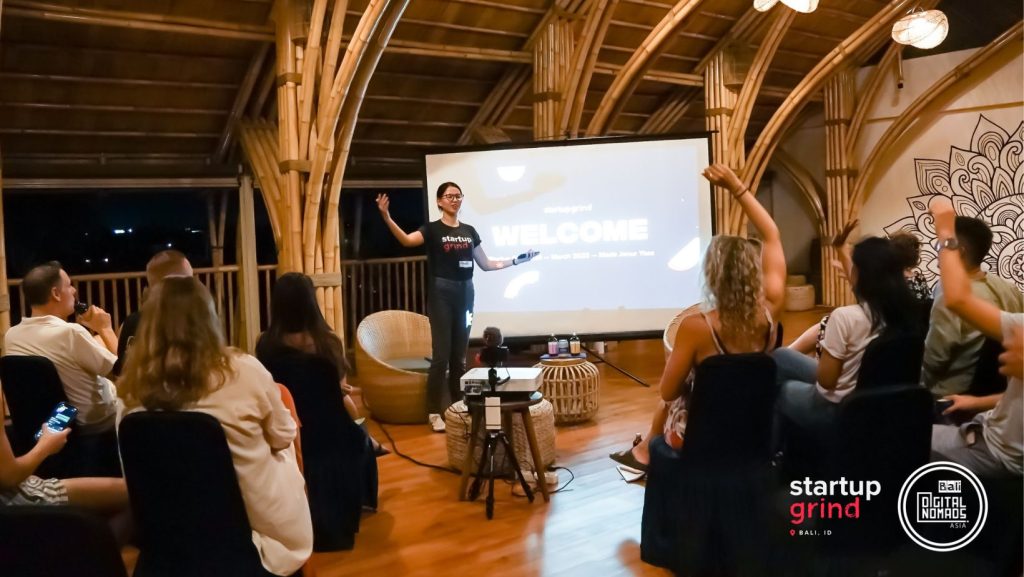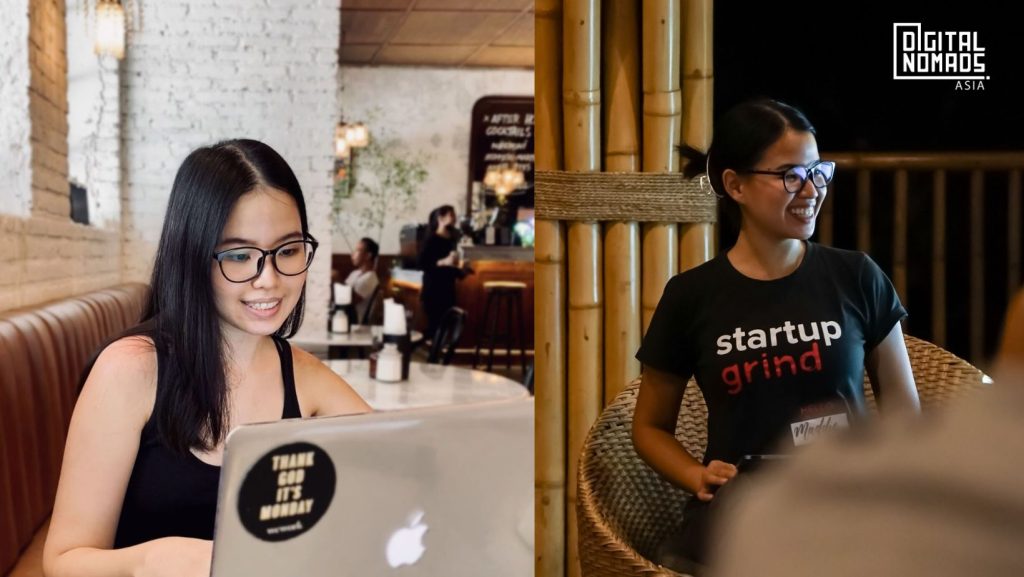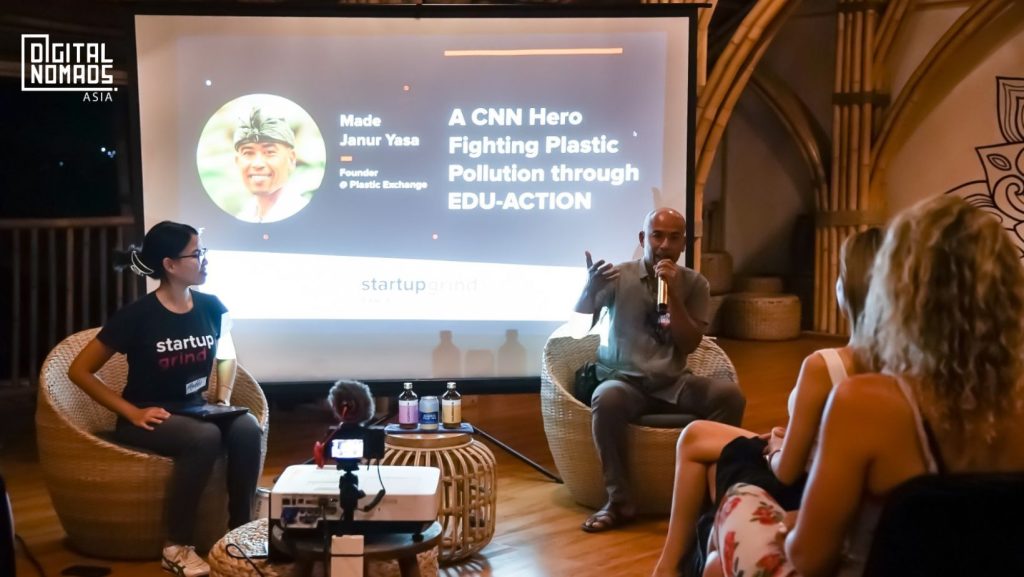Dara Amara
Creator
1y ago
Member Spotlight : 10 Questions with.. Madeleine

In our second episode of ’10 Questions With..’ we are pleased to have had the time to chat with Madeleine – Co- Director of Start Up Grind Bali.
Startup Grind is the world’s largest community of startups, founders, innovators, and creators. Their mission is to give startups everywhere the education and opportunities they need to build, grow, and scale their companies in Bali.
Startup Grind partners with Digital Nomads Asia, BWork Bali co-working space, as well as communities and supporters to bring monthly fireside chats not only to the local entrepreneurs and founders, but also to anyone who is interested in launching or working in a startup!
Here we go..
1. What inspired you to choose Bali as the location for your business, and how did you identify the opportunities here?
I initially chose to relocate to Bali during the Covid-19 pandemic as my work transitioned to a remote setup. Being Indonesian and having previously lived the typical city life, I realized that Bali is the ideal place for me. This decision was primarily influenced by the rich and diverse food culture (given my deep passion for food!) and the remarkably relaxed atmosphere, where people exhibit a more polite and calmer demeanour compared to the constant hustle of city life.
As I settled in, I actively expanded my network. Drawing on my experience in community building in Beijing, China – I decided, along with my friends, to establish Startup Grind Bali—a non-profit community catering to entrepreneurs. Our goal is to connecting ecosystem players in Bali’s thriving entrepreneurial landscape, fostering a supportive and collaborative environment.

2. Can you share your journey of establishing and growing your business in Bali, including any challenges you faced and how you overcame them?
The most significant challenge, in my opinion, was delving into the details of Indonesian laws and regulations to ensure that Startup Grind Bali could establish itself as a legitimate community adhering to all the necessary regulations. I highly recommend consulting and collaborating with professionals in this field to navigate the complexities effectively.
3. What specific aspects of Bali’s culture and lifestyle influenced your decision to run a business here, and how have these elements contributed to your success?
Bali, predominantly a Hindu Island, stands out as uniquely distinct from other islands in Indonesia. The rich cultural tapestry of Bali, characterised by a fusion of Hindu traditions and local customs, fosters an inclusive and accepting environment. Here, people also practice “Tri Hita Karana,” a key philosophy that I believe contributes to success, as it emphasizes the harmonious relationships between the three most important aspects of life: God, humans, and nature.
Secondly, Bali features a vibrant and diverse entrepreneurial community.
The island’s social scene, co-working spaces, and networking events provide abundant opportunities for individuals with various backgrounds to find common ground, connect, share ideas, and collaborate. Building a supportive network proves to be a pivotal factor in achieving success.
4. Were there any regulatory or logistical hurdles you encountered when starting your business in Bali, and how did you navigate through them?
Yes, I am fortunate because I am Indonesian and I speak Bahasa Indonesia as one of my native languages, and reading through local regulations was not an issue. However, as I am not a professional in this field, it can become quite confusing. It is still best to seek advice from Bali local professionals.
5. How do you engage with the local community in Bali, and how has building these relationships contributed to the success of your business?
Partially thanks to Startup Grind Bali being a non-profit community itself, linking up and collaborating with other relevant and similar communities was not challenging. However, a significant part of our values is to give back to the community, and we frequently organise donations to local charities by allocating revenue raised from event ticket sales.

6. What industries or sectors do you believe thrive in Bali, and how did you identify a niche for your business within this context?
Based on what I have observed, I would say environmental technology and sustainability, especially in the tourism sector. The second part of the question doesn’t apply, as at Startup Grind Bali, we focus on technology and entrepreneurship across all industries, remaining industry-agnostic.
7. Could you elaborate on the work-life balance you experience in Bali and how it compares to other locations where you might have considered establishing your business?
Personally, I consider the concept of work-life balance to be subjective, varying from one person to another, and there’s no secret formula to achieve it.
However, If I were to compare my experiences in Bali with my time in Beijing, I’d say the work culture in Bali places a greater emphasis on work quality rather than quantity. People are more independent and have more control over their time and location. Initially, I found it challenging to make plans as day-to-day spontaneity is more accepted here, and delays are not perceived as severely as in big cities like Beijing, where everything is more structured and planned ahead.

8. How do you stay connected with the global market while operating in Bali, and what strategies have you employed to reach an international audience?
As we are a Bali focused chapter, Startup Grind Bali focuses solely on the people, entrepreneurs, founders and change makers based in Bali and how they are impacting the eco system in Bali. Our content reaches an international audience but our mission has been Bali-focused.
9. In terms of sustainability and environmental awareness, how has Bali influenced your business practices, and what steps have you taken to contribute positively to the local society?
Our monthly events prioritise eco-friendly practices, such as partnering with local vegan food vendors, minimising single-use plastics, discouraging food waste, and utilising sustainable materials. We aim to create a minimal environmental footprint during our activities.
In addition to our event practices, Startup Grind Bali actively engages with local environmental and sustainability organisations, such as Eco-tourism Bali and Bali Xchange. We collaborate with them to raise awareness about sustainability and the conservation of Bali’s environment, addressing concerns related to waste management, river pollution, open burning of plastic waste, and its effects on air quality.

10. Reflecting on your experience, what advice would you give to aspiring entrepreneurs looking to start or relocate their businesses to Bali?
- Conduct thorough research and if you’re an expat, consult with visa professionals before relocating.
- Learning the language is immensely helpful in navigating your surroundings.
- Join existing communities to initiate network building, and don’t hesitate to ask questions; you’ll be surprised by how warm and welcoming everyone is in Bali.
Thank you very much Madeleine for your time and we wish you continued success for all the good work you are doing in Bali.
Follow Madeleine on Linkedin or Instagram.
Follow Startup Grind Bali to see all the cool things they are doing in Bali.
This post is part of a community
On WhatsApp
430 Members
Loading...
Hosted by
Digital Nomads Asia